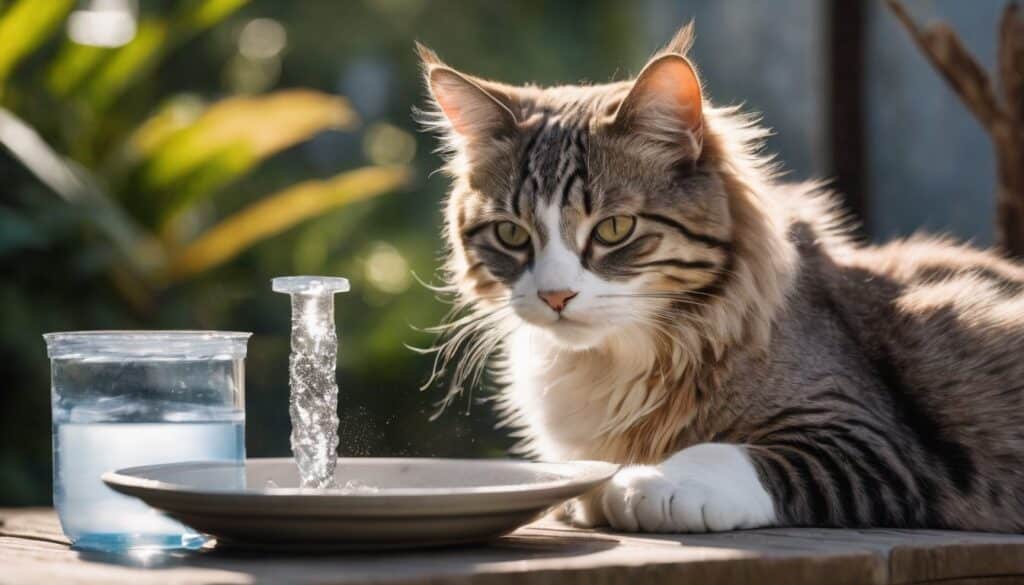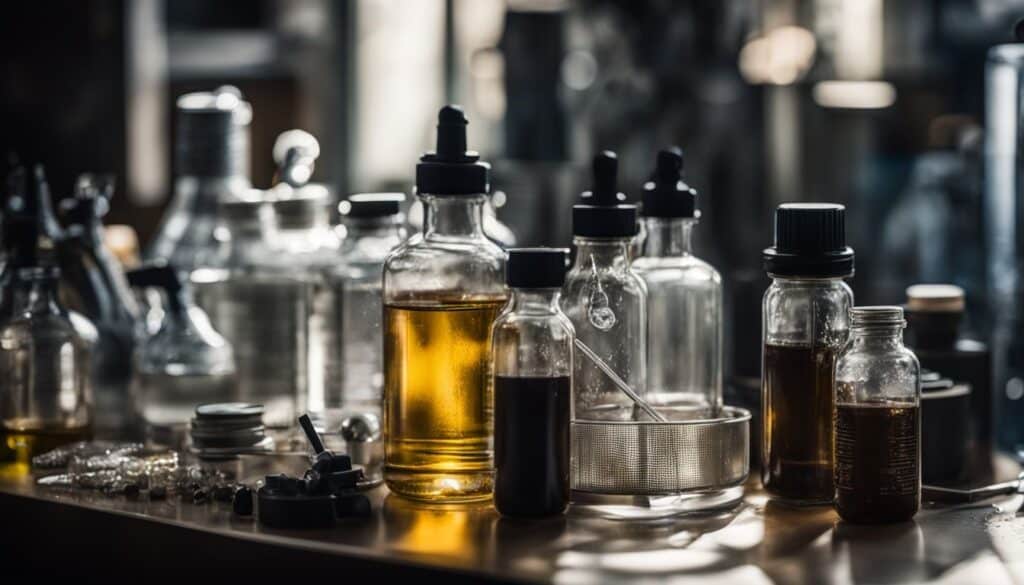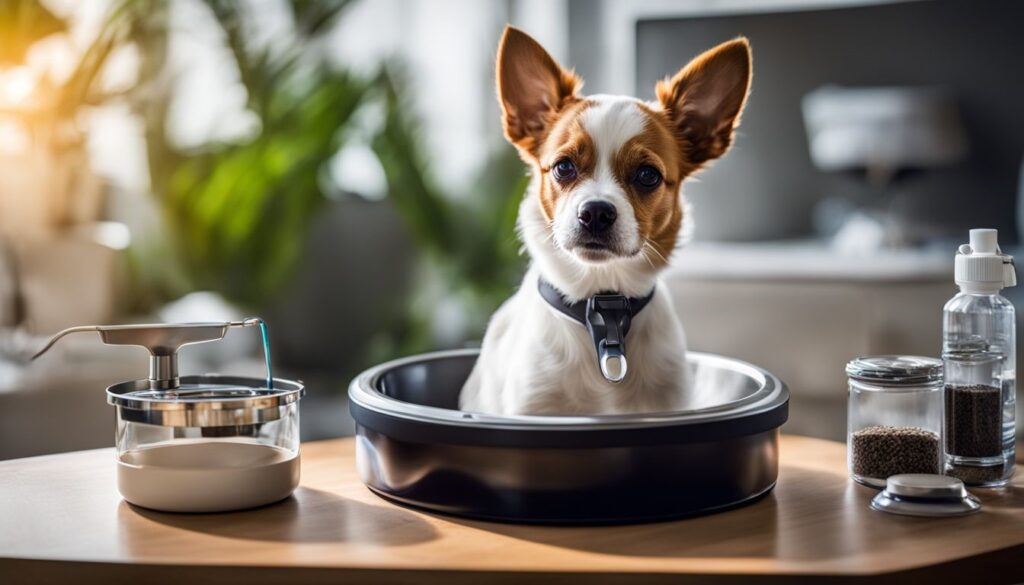The Benefits And Risks Of Using Colloidal Silver For Pets

Concerns about the health and well-being of our pets often lead us to explore alternative treatments. Colloidal silver, touted for its medicinal properties, has become popular among pet owners.
This blog post will demystify colloidal silver’s use for furry friends, examining its purported benefits and potential downsides. Stay informed on how to keep your pets healthy and safe with this insightful guide.
Key Takeaways
-
- Colloidal silver is a liquid with tiny silver particles used by some pet owners as a natural antibiotic, but the FDA has not approved it for pets.
-
- It could help with issues like bacteria, fungus, and skin problems in pets, but there’s no strong science to show it’s safe or works well.
-
- Pets taking colloidal silver might have side effects like gut problems, organ damage, or skin color changes; it can also mess up how other medicines work.
-
- Other options for pet health include herbs, probiotics, fish oil, CBD oil, aloe vera, manuka honey, turmeric, and homeopathy. Always ask your vet before trying them out on your pet.
-
- The FDA warns against colloidal silver because it may not benefit your pet’s health. Always talk to a vet first if you’re considering using colloidal silver or any new treatment.
What is Colloidal Silver, and How is it Made?

Colloidal silver is a liquid suspension of tiny silver particles, often marketed as a natural antibiotic. It is made by suspending pure silver particles in water using an electrical process.
Different Types of Colloidal Silver
-
- True Colloidal Silver
-
- Ionic Silver
-
- Silver Protein
Misleading Labels
Some companies might put things on their labels that aren’t true. This can confuse people who want to use colloidal silver for dogs or cats. They may think a product is strong and good, but the labels might not be clear about how much silver is in it.
The FDA says that these products should not be sold as drugs you can get without a prescription because they may not be safe.
It’s hard to know if the silver will work or if it’s even there at all. Even though some sources claim no one has ever been hurt by colloidal silver, we must be careful. The label might say “bio-active” or “highest quality,” but it doesn’t always mean the product is best for your pet’s health.
Always check what experts and real customer reviews say before picking a colloidal silver spray or solution for your furry friend.
How Does Colloidal Silver Work?

Colloidal silver is believed to work by releasing silver ions, which can have antimicrobial properties. Some potential benefits for pets include its use as an antifungal and in treating ear infections, although scientific evidence supporting these claims is lacking.
Potential Benefits for Pets
Colloidal silver is famous for fighting germs and helping pets heal. Pets can get many perks from using this silver liquid.
-
- Fights Bacteria: This silver solution can kill bad bacteria, even ones that medicine doesn’t stop. It’s like a superhero for pets who need help battling infections.
-
- Works Against Fungus: Skin troubles caused by fungi may improve with colloidal silver. It is an antifungal to keep your pet’s skin happy and healthy.
-
- Deals with Viruses: If your pet is dealing with viruses, colloidal silver might be able to help. It has properties that work against these tiny troublemakers.
-
- Eye Care: Pets with eye problems like infections or allergies may feel better after using colloidal silver. This remedy can soothe their eyes and reduce redness.
-
- Helps Heal Skin: For cuts, scrapes, or hot spots, spraying some of this liquid on the area could speed up healing. It helps fix skin faster so your pet feels good again.
-
- Prevents Ear Infections: A few drops in your pet’s ears can prevent ear infections. No more itchy and irritated ears, which means a happier furry friend.
-
- Natural Option: Some people like natural things instead of man-made medicine for their pets. They choose colloidal silver as a gentle way to help their pals get well without harsh chemicals.
-
- Improves Immune System: Using silver might boost your pet’s immune system. When their bodies are stronger, they fight off sickness better.
Lack of Scientific Evidence
Though colloidal silver has been used in alternative health practices, there is a lack of credible scientific studies demonstrating its safety and efficacy for pets. The FDA does not regulate or approve colloidal silver for use in pets, and the National Center for Complementary and Integrative Health states that oral colloidal silver has no known benefits for pets.
Additionally, high-quality studies on the health effects of colloidal silver are lacking, but evidence points to potential dangers for pets.
While some anecdotal evidence exists regarding the benefits of colloidal silver for pets, it’s crucial to consider the lack of scientific backing. Without substantial research supporting its safety and effectiveness, pet owners should approach colloidal silver with caution.
Is Colloidal Silver Safe for Pets?
While colloidal silver has been touted as a natural remedy for various pet health issues, it’s important to consider the potential risks and side effects. Understanding the safety concerns, from skin irritation to possible medication interactions, is crucial for responsible pet care.
Consulting with a veterinarian is essential before introducing colloidal silver into your pet’s wellness routine.
Potential Risks and Side Effects
- Overexposure to colloidal silver can be toxic for pets, leading to potential risks such as gut dysbiosis, organ damage, and developmental problems.
- Using colloidal silver internally for pets may eliminate good bacteria in their gut, impacting digestive health.
- Long-term topical or oral use of colloidal silver is unsafe for pets as it can cause physical cell damage.
- Ingesting excessive colloidal silver can harm both humans and animals in the long term.
- Common side effects for pets include general malaise, lethargy, weight loss, and bluish-grey skin discoloration known as argyria.
- While tasteless and non-toxic, using colloidal silver for pets should be approached cautiously due to its potential risks and side effects.
Possible Interactions with Medications
Colloidal silver may interact with prescription medicines, such as penicillin and antibiotics. When used alongside certain drugs, it can lead to poor absorption, particularly with antibiotics and thyroxine.
This interaction can impact the effectiveness of these medications in treating your pet’s health conditions. It is crucial to consult a veterinarian before using colloidal silver for your pet, especially if they are already on prescribed medication.
The potential interactions between colloidal silver and medications highlight the importance of seeking professional advice when considering its use for pets. Understanding how it could affect prescribed treatments can help ensure the safety and well-being of your furry companion.
FDA Warnings
The U.S. Food and Drug Administration (FDA) has strongly cautioned against using colloidal silver for treating any illness or condition in pets. The FDA does not approve of using colloidal silver, emphasizing that it is not safe or effective for pets due to its potential health risks and lack of proven benefits.
In 1999, the FDA ruled that over-the-counter products containing colloidal silver
are unsafe, underscoring their position against using this substance in pet health care.
Considering these warnings from a reputable regulatory body, it is crucial to prioritize safer and evidence-based alternatives for maintaining your pet’s well-being. With the safety and effectiveness concerns raised by the FDA around colloidal silver for pets, consulting with a veterinary professional becomes even more imperative for ensuring proper care without unnecessary risks or uncertainties related to this controversial supplement.
Alternatives to Colloidal Silver for Pet Health
Alternative options for pet health include natural remedies, supplements, and CBD oil. It is important to consult with a veterinarian before choosing an alternative treatment for your pet.
Natural Remedies and Supplements
-
- Herbal Remedies: Herbs like echinacea and garlic may support immune systems. However, it’s important to consult a veterinarian before using any herbal remedy for pets.
-
- Probiotics: These can help maintain a healthy gut flora in pets, supporting their overall well-being. Look for pet-specific probiotic supplements to ensure safety and efficacy.
-
- Omega-3 Fatty Acids: Found in fish oil, these can promote healthy skin and coat in pets, providing anti-inflammatory benefits and aiding skin healing.
-
- CBD Oil: This natural supplement has gained popularity for its potential calming effects on pets and ability to support joint health.
-
- Aloe Vera: Its soothing properties can be used topically to alleviate mild skin irritations in pets, relieving itching or minor wounds.
-
- Manuka Honey: Known for its antibacterial properties, it can be applied topically to minor wounds, promoting natural healing.
-
- Turmeric: This spice contains curcumin, known for its anti-inflammatory and antioxidant properties, which may benefit pets with certain conditions.
-
- Homeopathy: Some pet owners may consider homeopathic remedies as an alternative approach to maintaining their pet’s health, such as Arnica for pain relief or Calendula for wound care.
CBD Oil as an Alternative Option
CBD oil is being studied for its potential to manage seizures in dogs. Research also suggests that CBD may have other benefits for dogs, such as managing osteoarthritis and idiopathic epilepsy.
However, further research is needed to understand these benefits’ extent fully. Clinical studies indicate that CBD in dogs can be safe at given doses and may contribute to their overall well-being.
It’s important to note that before giving your pet any CBD products, you should consult with a veterinarian. They can guide proper dosage and ensure it won’t interact with any medications your pet may take.
Importance of Consulting with a Veterinarian
Before using colloidal silver for your pets, it is crucial to consult with a veterinarian. You can make informed decisions about your pet’s well-being by prioritizing their health.
Understanding the safety, risks, and alternatives associated with colloidal silver is essential in ensuring the best care for your pets. Consulting a veterinarian provides valuable insights into the potential benefits and risks of using colloidal silver for your pets’ specific health needs.
It is important to be aware that consulting with a veterinarian before using colloidal silver can help address any concerns about its use for pets. Veterinarians can offer personalized guidance based on their understanding of your pet’s unique health requirements, potentially uncovering alternative options or considering possible interactions with medications that might affect your pet’s well-being.
FAQs
Q: What are the benefits of using colloidal silver for pets?
A: Colloidal silver is believed to have antibacterial, antiviral, and anti-inflammatory properties, which may help treat various health issues in pets. It can be used for topical applications as well as for internal use.
Q: How can I choose the best colloidal silver for my pets?
A: Look for colloidal silver products made in the USA with a high ppm (parts per million) and a bio-active formula. Reading customer reviews can also help you find the best product for your pets.
Q: Are there any risks associated with using colloidal silver for pets?
A: While colloidal silver is considered safe when used appropriately, there are potential risks associated with overuse or misuse, such as argyria (a condition that causes the skin to turn bluish-gray) and silver toxicity.
Q: Can colloidal silver be used as a spray for dogs?
A: Yes, colloidal silver can be used as a spray for dogs to help with skin conditions, cuts, and wounds. Using a properly formulated colloidal silver solution specifically designed for pets is important.
Q: What are some popular brands that offer colloidal silver for pets?
A: Some popular brands offering colloidal silver for pets include Glacier Peak Holistics, Sovereign Silver for Pets, and HighVibe Silver. These brands offer colloidal silver products suitable for pets’ use.
Q: Is colloidal silver safe for cats and dogs?
A: Colloidal silver is considered safe for cats and dogs when used in the recommended dosage and application. However, consulting with a veterinarian before using colloidal silver on pets is essential.
Q: How does colloidal silver work for pets’ health?
A: Colloidal silver contains positively charged silver atoms that are believed to help combat various pathogens by disrupting their cellular processes. This may aid in supporting pets’ immune systems and overall health.
Q: Can colloidal silver be used as an alternative to antibiotics for pets?
A: While colloidal silver is sometimes used as an alternative to antibiotics, it’s important to note that antibiotics don’t just kill bad bacteria but also have specific mechanisms for treating infections, which colloidal silver may not fully replicate.
Q: Is colloidal silver suitable for topical use on pets?
A: Yes, colloidal silver can be used topically on pets to address skin issues, cuts, and minor wounds. However, it’s important to ensure that the product is specifically formulated for topical pet use.
Q: What should I consider when choosing the right colloidal silver product for my pets?
A: When selecting a colloidal silver product for your pets, consider factors such as the product’s formulation for pets, its intended use (internal or topical), the reputation of the brand, and the unprecedented particle size, which can affect the product’s efficacy.

